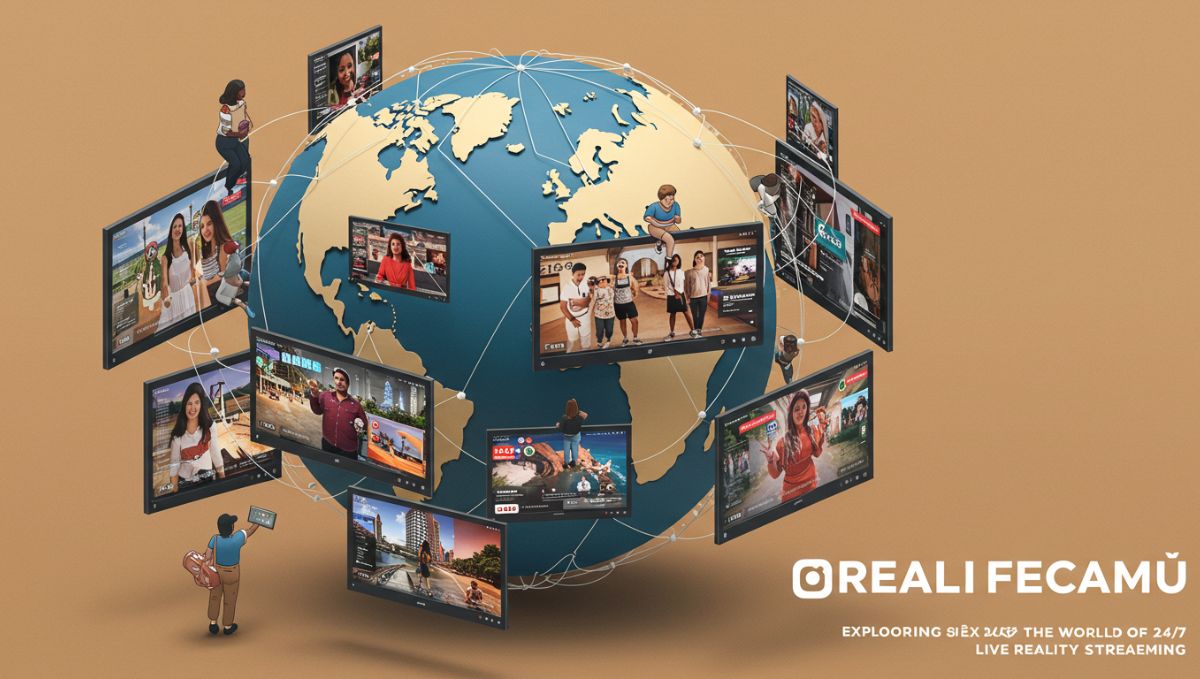In today’s digital era, people crave real and unfiltered content. Beyond movies, TV shows, and scripted entertainment, a new form of online media has emerged—live reality streaming. One platform that has drawn attention in this space is RealLifeCamù.
RealLifeCamù takes the concept of reality shows a step further by offering 24/7 access to real people in their private environments. But what exactly is it, how does it work, and why has it become so controversial and popular at the same time? Let’s take a deep dive.
What is RealLifeCamù?
RealLifeCamù is an online live-streaming project where viewers can watch the daily lives of real individuals or couples through cameras installed in their homes. Unlike traditional reality TV, there are no scripts, no staged sets, and no edited scenes. What you see is raw, unfiltered, and happening in real time.
This concept provides an entirely new level of voyeuristic entertainment. Subscribers can switch between different cameras, rooms, and households, getting a unique look into how others live their daily lives.
How RealLifeCamù Works
The platform works on a subscription-based model. Here’s a quick breakdown:
-
Cameras in Homes – Houses or apartments are equipped with multiple cameras placed in common spaces like kitchens, living rooms, bedrooms, and sometimes even bathrooms.
-
24/7 Streaming – The cameras broadcast continuously, allowing subscribers to watch live any time of the day.
-
Multiple Perspectives – Users can choose which house or room to watch, switching between different people’s lives.
-
Subscription Access – While some previews may be free, full access typically requires a paid membership.
The Appeal of RealLifeCamù
Why do people watch RealLifeCamù? The reasons vary, but here are some common factors:
-
Curiosity – Human beings are naturally curious about how others live.
-
Authenticity – Unlike social media filters or scripted shows, RealLifeCamù feels raw and unfiltered.
-
Entertainment – Viewers find amusement in the ordinary—watching meals, conversations, or daily routines.
-
Voyeurism – For some, there’s an added thrill in being able to observe private moments.
Controversies Surrounding RealLifeCamù
With its rise in popularity, RealLifeCamù has also sparked significant debate.
Privacy Concerns
Critics argue that the platform blurs the line between entertainment and invasion of privacy. Even though participants agree to be filmed, the ethics of constant surveillance are often questioned.
Voyeurism Debate
The voyeuristic element has sparked controversy, with many comparing it to digital peeping. This raises moral questions about whether such entertainment is healthy for viewers and participants.
Regulation Issues
Since the platform broadcasts globally, laws about streaming, nudity, and data protection vary from country to country, creating legal grey areas.
Why People Participate in RealLifeCamù
It may seem strange to voluntarily live under 24/7 surveillance, but participants have their own motivations:
-
Financial Incentives – Participants are often paid or receive benefits from subscriptions.
-
Fame – Just like reality TV stars, some enjoy the attention and recognition.
-
Lifestyle Choice – A few may genuinely embrace the idea of total transparency as a lifestyle experiment.
RealLifeCamù vs. Traditional Reality TV
Unlike Big Brother or Love Island, RealLifeCamù eliminates directors, editing, and storylines. What you see is 100% organic, with no guarantees of drama or excitement.
This is both a strength and weakness:
-
Strength – Authenticity. Nothing is staged.
-
Weakness – It can be boring, as viewers might watch hours of mundane activity.
Safety and Ethical Considerations
For potential viewers or participants, it’s important to approach RealLifeCamù responsibly.
-
For Viewers – Remember that people on screen are still real individuals. Treat the content with respect and avoid unhealthy viewing habits.
-
For Participants – Consider the long-term consequences of constant exposure. Even after leaving the platform, recordings may still circulate online.
The Global Popularity of RealLifeCamù
Despite controversies, the platform has built a solid audience base. Fans from around the world log in daily, fascinated by the idea of living “through someone else’s eyes.”
In some ways, RealLifeCamù mirrors the broader trend of digital voyeurism—from social media live streams to reality vlogs on YouTube. The difference is simply the intensity and continuity of the surveillance.
Alternatives to RealLifeCamù
If the idea of 24/7 surveillance feels too extreme, there are other ways to experience reality-based entertainment online:
-
Twitch IRL Streams – Live, interactive broadcasts of real life, often more controlled by the streamer.
-
YouTube Vlogs – Edited but still personal looks into people’s lives.
-
Social Media Live Feeds – Shorter, casual glimpses into everyday activities.
These alternatives offer reality entertainment without the same level of controversy.
The Future of RealLifeCamù
Looking forward, platforms like RealLifeCamù may evolve in several directions:
-
Integration with VR – Allowing users to experience lives in an even more immersive way.
-
Stricter Regulations – Governments may step in to regulate privacy and content.
-
Hybrid Experiences – Blending scripted and unscripted content for a balance between entertainment and reality.
Whether it remains a niche interest or becomes mainstream depends on how society views the balance between transparency and privacy.
Conclusion
RealLifeCamù pushes the boundaries of what reality entertainment can be. By offering 24/7 live streams of real people’s lives, it provides raw, unscripted content unlike anything else online.
While its appeal lies in authenticity and curiosity, it also raises important ethical, legal, and privacy debates. For viewers, it’s a glimpse into another world. For participants, it’s a choice that comes with both rewards and consequences.
As society becomes more digital, platforms like RealLifeCamù may shape the future of entertainment—challenging us to reflect on where we draw the line between curiosity and intrusion.
